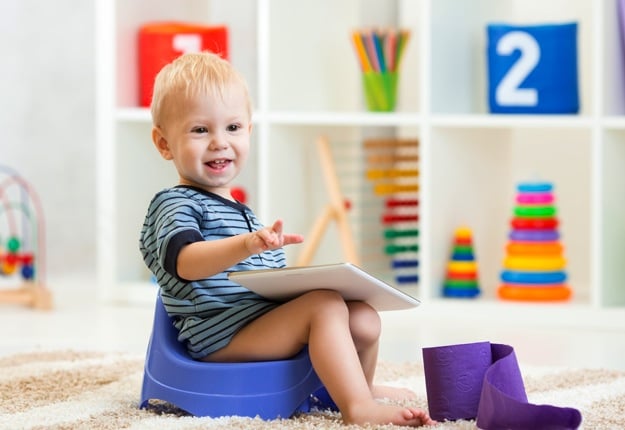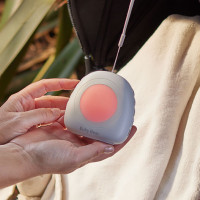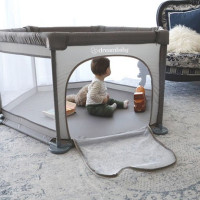Often we think of incontinence as an adult issue; one in four Australian adults (4.8 million) is affected by incontinence.
We may not be aware that incontinence issues often start early, with one in five primary-age children wetting themselves at school, and one in 12 experiencing ongoing incontinence issues.
There is plenty of evidence telling us that if incontinence isn’t handled sensitively in these formative years, there can be long-term psychological and physical consequences.
The good news is that, in the majority of cases (where there are no neurological or developmental causes) incontinence is preventable. The key is to start good habits early.
Let’s start at the beginning…
Toilet training
Children instinctively start mimicking their parents and siblings from an early age, and from about the age of 18 months they are big enough to climb a step-up frame and sit on an adult toilet seat (with insert). Let them climb up; it doesn’t matter if they’re not interested in doing anything, but more about familiarising themselves with the sensation.
Some research suggests starting toilet training between 18 and 24 months, while other research suggests between 24 and 27 months.
You are the best judge; if your child can stay dry for two hours or stay dry after their afternoon nap, follow simple commands and pull their pants up and down, you might consider starting.
Timing is also the key as to when to take them to the toilet; the best times are when they get up in the morning, straight after meals or snacks, and after their afternoon nap. Better still, if your child has a regular time when they open their bowel, it is a good idea to put them on then.
Stay positive. Clean ups need to be done calmly with no fuss, and it is okay to take a break if things get too stressful.
Constipation – avoid it, avoid it, avoid it!
Constipation is one of the most common reasons for delayed or incomplete toilet training. Just one painful experience can be enough to make a child avoid going when they get the urge. This unfortunately, will only make the stool more difficult to pass as it dries out further in the colon.
Approximately one in three primary school-age children can be constipated at any given time, and there is the risk that it will manifest into a long-term condition.
Constipation is one of the main causes of both urinary and faecal incontinence. This is because a full, impacted bowel can take up so much space in the pelvic region it can compress the bladder and can cause bladder issues. Even more distressing, it can cause faecal overflow when liquid faeces forces its way around the solid stool without the child knowing.
Most cases of constipation are preventable by ensuring your child’s diet is high in fibre, they consume sufficient fluids to satisfy their thirst (avoiding carbonated or sugary drinks) and exercise regularly.
It’s also important to establish a regular bowel-emptying regime. One of the best ways to achieve this is to have your child sit on the toilet for about five minutes (perhaps with a favourite book) about 20 minutes after a meal and a warm drink (preferably breakfast). This is when the gastro-colic reflux, a mass movement of contents through the bowel, is most likely to occur.
Your child should only have to push gently to empty their bowel, and should never have to strain hard.
If your child shows signs of constipation or of not wanting to pass a stool, it’s a good idea to see your doctor or speak to one of the continence nurse advisors on the free National Continence Helpline (1800 33 00 66).
Bedwetting – what’s going on?
Most children will be dry at night by school age. But children develop at different rates, and about 17 percent of five-year-olds will still wet the bed at least twice a week and some may have occasional accidents until age seven.
There are three main causes of bedwetting:
- Some children are such deep sleepers they don’t wake up to the sensation of a full bladder.
- Some children have overactive bladders (if so, they will usually wet the bed more than once at night, and may go often, in a hurry, during the day)
- Some children don’t make enough antidiuretic hormone, so produce a lot of urine overnight.
Follow these simple steps to help reduce the incidence of bedwetting:
- Regulate your child’s fluid intake so it’s highest in the morning and tapers off as the day goes on.
- Always get your child to go to the toilet before going to bed.
- Take steps to avoid or treat constipation if it is present.
It’s better to address bedwetting concerns earlier rather than later, so if your child still wets the bed regularly at age seven, or if they suddenly start bedwetting after having been dry, then it’s time to seek professional help.
You can find out who the closest, most appropriate health professional is by contacting the National Continence Helpline (1800 33 00 66).
When you need help
Parents with concerns about their child’s bladder and bowel habits can phone free National Continence Helpline (1800 33 00 66), where continence nurses with a special interest in children can provide advice, referrals and resources.
This information is supplied by the Continence Foundation of Australia, the peak national organisation working to improve the quality of life of the 4.8 million Australians affected by incontinence. For more information, go here.
Have any of your children had to overcome an issue in regards to toilet training? Please share in the comments below.





















9:53 am
8:20 pm
11:48 am
9:04 am
-

-
-
-
mom88528 replied
- 10 Nov 2015 , 4:56 pm
Reply4:06 pm
-

-
-
-
Cynthea Jenke replied
- 27 Oct 2015 , 11:17 pm
Reply11:50 am
-

-
-
-
Cynthea Jenke replied
- 27 Oct 2015 , 11:18 pm
Reply8:06 am
-

-
-
-
Cynthea Jenke replied
- 27 Oct 2015 , 11:19 pm
Reply10:50 pm
10:24 pm
-

-
-
-
Cynthea Jenke replied
- 27 Oct 2015 , 11:21 pm
Reply8:20 pm
-

-
-
-
mom88528 replied
- 20 Oct 2015 , 11:10 am
-

-
-
-
mom94125 replied
- 23 Oct 2015 , 2:02 pm
-

-
-
-
Cynthea Jenke replied
- 27 Oct 2015 , 11:26 pm
Reply5:44 pm
-

-
-
-
Cynthea Jenke replied
- 27 Oct 2015 , 11:22 pm
Reply3:14 am
-

-
-
-
Cynthea Jenke replied
- 27 Oct 2015 , 11:24 pm
Reply9:08 pm
-

-
-
-
Cynthea Jenke replied
- 27 Oct 2015 , 11:27 pm
Reply7:32 am
-

-
-
-
Cynthea Jenke replied
- 27 Oct 2015 , 11:29 pm
Reply3:45 pm
-

-
-
-
Cynthea Jenke replied
- 27 Oct 2015 , 11:30 pm
Reply- 1
- 2
- 3
- »
Post a comment